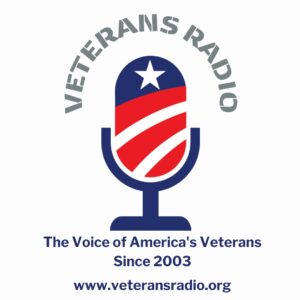Rev. Captain Dale Goetz
U.S. Army Chaplain, Iraq and Afghanistan
By James G. Fausone
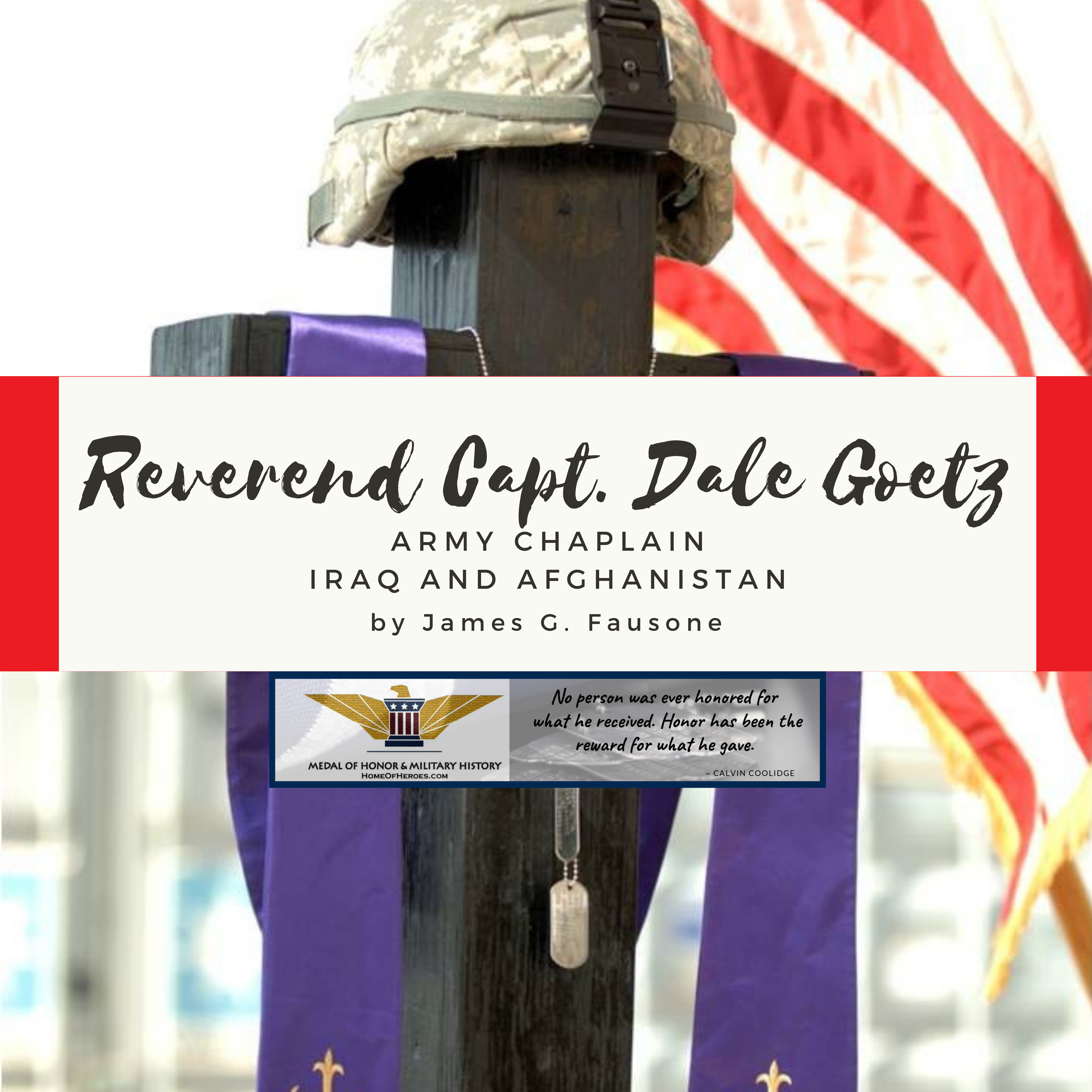
In 2010, Captain Dale Allen Goetz and four fellow soldiers were fatally struck by a roadside bomb in Afghanistan. Goetz would be the first Army chaplain to die in combat since the Vietnam War. He was a person of faith and love for his fellow man.
The Early Years and Seminary
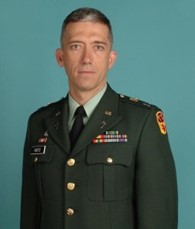 Born in South Dakota in 1967 and growing up in Oregon, Dale Goetz saw joining the military as a way to move forward in the world. Little did he know that the world was going to be full of hostility and result in a short but impactful life.
Born in South Dakota in 1967 and growing up in Oregon, Dale Goetz saw joining the military as a way to move forward in the world. Little did he know that the world was going to be full of hostility and result in a short but impactful life.
Chaplain Goetz grew up near Hood River, Oregon, a 1986 graduate of Horizon Christian School. At about the age of 18, he accepted Jesus Christ as his Lord and Saviour. Dale’s father, Dale H., was a Navy veteran. Nevertheless, immediately after high school, he enlisted in the U.S. Air Force, an experience that would later motivate him to join the chaplaincy. As an airman, he did a single four-year tour. He was stationed at Lowry AFB and attended its church services. During that time, he felt the need for biblical education and was called to ministry.
Few men move from warrior to chaplain. He went to bible college at Maranatha Baptist Bible College of Watertown, Wisconsin. In 1991, he met Christina (Christy) Marie Moen at Maranatha. By 1994, the couple’s romance led to marriage.
In 1995, he graduated from Maranatha Baptist. At Maranatha, he found an institution committed to the principles on which it was founded in 1968 —the truth of God’s Word and adherence to Baptist distinctives. This was a time of great joy as he met his future wife Christy and was deepening his faith.
The Baptist religion is made up of a common tradition that emphasized, “the Lordship and atoning sacrifice of Jesus Christ, believers’ baptism, the competency of all believers to be in direct relationship with God and to interpret Scripture, the influence of the Holy Spirit on individual lives and ministries, and the need for autonomous congregations free from government interference or hierarchical polity” according to the American Baptist Churches USA. Baptists, like other Christian religions, have debated for centuries answering the call to war and the role those of faith should play. Dale Goetz was rooted in this independent and direct relationship with God.
Yearning for more education and training, he earned an MDiv from Central Baptist Theological Seminary of Minneapolis, Minnesota in 2000. Dale worked his way through seminary, including a stint at a hardware store. This was a much better job than the dairy plant he worked at in high school. These jobs and his Air Force tour shaped him into the regular guy that others could relate to and approach for ministry and counseling. He would later be known by his troops as the “chaplain with dirty boots.”
Like many, the events of September 11, 2001, changed his view of the world. He began to explore and experience the role of different religions in the world. He had little exposure to the Muslim religion but sought to understand it and its believers. He traveled the path of religious men going back to the time of St. Francis of Assisi, a soldier turned holy man.
At about the age of 19, Francis of Assisi became a soldier and went into battle against the nearby town of Perugia. In the early 1200s, Francis was captured and taken prisoner. He was held in a dungeon for a year and was only released when his father paid ransom money in return for his freedom. Over the next few years, Francis began to see visions from God that changed his life. At first, he thought that God had called him to fight in the Crusades. However, he had another vision that told him to help the sick. Finally, when praying in a church, Francis heard God tell him to "repair my church, which is falling in ruins." As a poor Christian monk, Francis twice in 1219 sought an audience with the great Muslim leader al-Malik al-Kamil to talk about religion and try to seek peace. He and the Sultan did meet in Egypt and held dialogues that today are used to portray St. Francis as a peacemaker and proponent of interreligious dialogue. Scholars debate that if Francis was not a prisoner of war, and possibly suffered PTSD, there would be no St. Francis nor religious orders of followers.
The warrior-turned-preacher, Dale Goetz spent the evening of September 10, 2001, trying to convince a Muslim man (married to a Catholic woman) of the merits of Christianity. “It was the first time I had really encountered a Muslim man theologically and we had an open religious dialogue,” Goetz wrote in 2008. “I learned much from him about his belief system.” While he said he failed to get the husband to convert, Goetz added that their discussion “helped me to understand why those men flew those planes to their deaths” the following day. What he took away from that session is that Muslims believe “there is no greater act of sincere faith or virtuous act than dying a martyr’s death for their religion.”
He acknowledged that Muslim concerns over what they perceive as a degenerate Western culture can drive some Muslims toward terror. “As Americans, we repudiate the practice of the terrorist,” he said. “Though I disagree with their practice, I do understand their complaints against western society.” Goetz wondered if Americans are devoted to something so much that they would willingly die for it. Chaplain Goetz wrote in a 2008 editorial, “Some love their spouse or kids enough that they would die for them. Do you love anything that much?” He concluded, “Our love for freedom is worth dying for and many have gone before us to preserve this freedom.” It is with that spirit he approached taking his ministry back into military service.
Service as a Chaplain
After four years of ministry in a small South Dakota church, he sought an appointment and was accepted as an Army chaplain. His young wife naturally questioned that decision, like so many family members of those who join the military today. At the outset of the war in Iraq, when Dale Goetz told his wife that he wanted to join the Army to become a chaplain, Christy Goetz was concerned. “I told him: ‘You’re not going over there and getting killed,’” she recalled. “I mean, he’s my honey. I love him. I don’t want anything to happen to him.”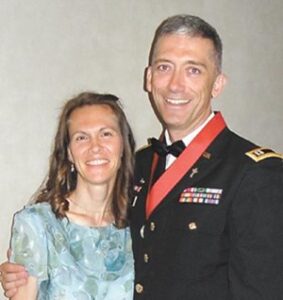
“I prayed on it and realized that this is what God wants him to do,” Christy Goetz recalled. “Who am I to stand in God’s way?” Inherently as every chaplain’s wife knows: “They may carry holy books instead of rifles, but they’re still soldiers, and they still tread in harm’s way.” She did not grow up in a military family but she was at peace with service as part of God’s plan.
Christy Goetz had studied at Maranatha Baptist Bible College. Her spirit was guided by scripture: “Be on your guard: stand firm in the faith: be men of courage: be strong.” – 1 Corinthians 16:13. After his death, Christy described Dale as very optimistic, competitive, and fun. She explained how much of a family man he was and how much he loved his three sons. “It’s important to me that he was a Godly man and loved God and his country, and evidence today shows that’s truly who he was,” she said.
Enrolling as a chaplain candidate with the U.S. Army, Goetz was commissioned in 2004. As a new officer, he attended Chaplain School at Fort Jackson, South Carolina. He learned the roles and responsibilities of his new career.
A chaplain’s duties are wide-ranging and take a special person to perform. Chaplains are the military’s religious leaders, responsible for tending to the spiritual and moral well-being of service members and their families. The chaplain’s responsibilities include performing religious rites, conducting worship services, providing confidential counseling, and advising commanders on religious, spiritual, and moral matters.
Military Chaplains have commissioned officers stationed wherever there are military members, including overseas combat tours. They have an important role in any commander’s program for operational readiness and stress control.
Chaplains are not typically licensed clinical counselors; however, they adhere to absolute confidentiality and are prepared to help people with many life challenges, including work-related issues; combat stress; deployment anxiety; marriage and family; substance abuse, and finances.
The chaplain team includes chaplain assistants and religious program specialists, both of which are enlisted personnel. The team’s main obligations are to service members and their families. A chaplain assistant provides overall support to the chaplain. The role is behind the scenes making sure all the necessary tasks are completed. Dale Goetz would learn the importance of and operate with a chaplain assistant in Afghanistan.
Pastor Goetz deployed to Iraq for a year. He served at Ft. Lewis, Washington, Okinawa, Japan, and then Fort Carson. Along the way, he served an 11-month tour in Iraq. He earned the Meritorious Service Medal and was a three-time recipient of the Army Commendation Medal.
The Iraq war had started in March 2003 and was still raging when Goetz went to minister to the troops.
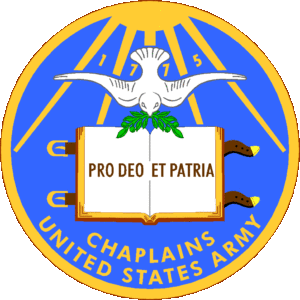 The military mission was still trying to find weapons of mass destruction, which were never found. In the summer of 2004, the Islamic State (ISIL) launched a military offensive in northern Iraq and declared a worldwide Islamic caliphate leading to Operation Inherent Resolve, another military response from the United States and its allies. This was a time marked by two Battles for Fallujah. The First Battle of Fallujah was in April 2004 and the offensive was resumed in November 2004. This was a time of serious conflict and a great need for chaplains. Reverend Goetz served in Iraq from 2004 to 2005 in his first deployment. He did not sit back and wait for the men to come to him. Dale continued to get his boots dirty.
The military mission was still trying to find weapons of mass destruction, which were never found. In the summer of 2004, the Islamic State (ISIL) launched a military offensive in northern Iraq and declared a worldwide Islamic caliphate leading to Operation Inherent Resolve, another military response from the United States and its allies. This was a time marked by two Battles for Fallujah. The First Battle of Fallujah was in April 2004 and the offensive was resumed in November 2004. This was a time of serious conflict and a great need for chaplains. Reverend Goetz served in Iraq from 2004 to 2005 in his first deployment. He did not sit back and wait for the men to come to him. Dale continued to get his boots dirty.
Upon his return from Iraq, Reverend Goetz, as a Baptist chaplain endorsed with the American Council of Christian Churches, he asked himself what was he so devoted to that he would be willing to die for? Yes, he would be willing to die for his men and his country.
His exposure to Islam and Muslims in the Mideast intensified his consideration of faith and desire to convert Muslims to Christianity. Goetz wrote on the differences between his Christianity and the religious views of terrorists the U.S. was then battling.
Reverend Goetz also served in Okinawa, Japan from 2006 to 2009. Dale and Christy then moved to Colorado Springs, Colorado in 2010, where they bought their first house and grew their family. He was assigned to the 4th Infantry Division for the 66th Armor Regiment’s 1st Battalion in Fort Collins, Colorado.
This storied infantry division was always in the fight. The 66th Armor Regiment is the oldest Armored unit in the United States Army, tracing its lineage to the beginning of the Tank Service in February 1918 under the command of Col. George S. Patton; it was first activated in the Regular Army as the 66th Infantry Regiment (Light Tanks). It deployed to Operation Enduring Freedom from 2010-2011, as part of the surge in the volatile Arghandab River Valley west of Kandahar City.
Shortly after settling into Fort Collins, he was sent to Afghanistan.
Afghanistan
Captain Goetz had told his wife that the soldiers who needed him most were under fire at small, exposed outposts. He felt compelled to visit them, said his chaplain’s assistant, Spc. Joshua Clare. “Circulating the battlefield,” Clare called it. “Chaplains don’t sit around the big bases waiting for soldiers to come to them,” said Chaplain Carleton Birch, a lieutenant colonel with the Office of the Chief of Chaplains. “They go out to where the soldiers are.”
Looking back, 2010 was the deadliest year in the first dozen years of America’s longest war. That year, 499 U.S. military personnel died in combat. In June 2010, General David Petraeus replaced General Stanley McChrystal as commander of U.S. forces, and U.S. airstrikes significantly increased. The enemy always has a say in the war. The Taliban responded with low-tech but deadly roadside explosive devices which were effective against men and armored vehicles. In part, these devices were to instill fear in troops freely moving along roads and the countryside. Explosions are designed to inflict pain and terror. Improvised explosive devices (IEDs) are indiscriminate weapons of war. IEDs killed 51.5% of those 499 American souls. Even good men not in the fight are destroyed by the unseen crude bombs left along the road.
Pastor Goetz left his family on August 2, 2010. The night before the family attended chapel and the last song the family sang was, “Take my life and let it be consecrated, Lord, to thee. Take my moments and my days; let them flow in endless praise, Let them flow in endless praise.” Christy felt it was a premonition. Within a month, life would change for Christy and her young family.
Within two weeks of being in the country, Chaplain Goetz was outside the wire when he was killed in action on August 30, 2010, near Arghandab River Valley, Kandahar Province, Afghanistan, after his convoy was struck by an IED. Four other Fort Carson (Colorado) soldiers were also killed in the same attack: Sgt. Jesse Infante, 30; Staff Sgt. Kevin J. Kessler, 32; Staff Sgt. Matthew J. West, 36; and Pfc. Chad D. Clements, 26. Goetz was the old man in the Humvee at 43.
Soldiers in a Humvee ahead of Goetz were struck by an IED. When Goetz was getting out of his vehicle to assist them, a second IED device exploded. While going to the aid of other soldiers, he lost his life.
A military tradition in Afghanistan, and all too often seen on U.S. television, is to recognize those killed by creating a memorial by placing a soldier’s rifle, boots, dog tags, and helmet in memoriam. Since chaplains do not carry a rifle, the troops erected a simple wooden cross to recognize the loss felt by the battalion.
Life Well Lived
Before that knock on the door, Christy had seen an internet news report that soldiers were killed in Kandahar. She asked God that Dale would be alright. Then the “King Kong” knock on that door; it was from a chaplain and Army casualty officer that every service family fears. She told them, “the Lord giveth and the Lord taketh away; Blessed be the name of the Lord.” She told the three boys, a 10-year-old, 8-year-old, and 18-month old that, “Daddy was with the Lord.”
All that was left for his religious and military family was to recognize his efforts.
Chaplain John Murdoch, director of Regular Baptist Chaplaincy Ministries, offered this statement on the passing of Chaplain Goetz:
“One of the most difficult messages an endorser can receive is the notification that a chaplain he endorses has been killed in action. On behalf of our Army chaplains and our entire chaplaincy family, I extend our sincere sympathy and prayers to the Goetz family, the chaplaincy family of the ACCC, and the families of the 1-66th Armor Battalion, 4th Infantry Division.
“Chaplain Goetz was a brother in the Lord as well as a brother in chaplaincy ministry. He did not deploy alone. His family was interwoven in his ministry; therefore, this loss will be felt not only by the soldiers but also by their families. Chaplain Goetz was a soldier of the cross and an American hero. It is my prayer for the Goetz family that the God of all comfort will be your portion today and until you are reunited in glory.”
His impact was noted by the Army Chief of Chaplains Major General Douglas Carver said:
“Dale was a selfless servant of God, a devoted husband and father, a strong American patriot, and a compassionate spiritual leader whose love for soldiers was only surpassed by his firm commitment to living his calling as a United States Army Chaplain.”
Pastor Stuart Schwenke, Faith Baptist Church, Oelwein, Iowa, met Chaplain Goetz in 1994 when they both attended the same church in Minneapolis.
“We are the same age, were married the same year, had our children born to us in the same years, and have been called into the ministry from similar backgrounds and have developed a similar view of ministry,” Pastor Schwenke said. “Dale was an independent Baptist to his core. He had a sharp mind for the intricacies of theology and exegesis.”
Goetz served as pastor of First Baptist Church, White, South Dakota, from 2000 to 2003. “His short pastoral ministry in White, S.D., brought him joy, but he longed for a ministry that would allow him to do disciple-making in a setting more suited to his gifting,” Pastor Schwenke said.
Goetz’s death captured the attention of national news and religious media, including a profile by Mark Thompson in Time magazine. In September 2010, Thompson wrote:
“His is a passing worth pondering. Chaplains represent a special category of troops, especially in the lengthy wars the U.S. has been waging in Afghanistan and Iraq. Many Army mental-health workers in recent years have told me that the counseling done, and solace provided by, chaplains are just as valuable to troops as the therapy and drugs offered by front-line psychiatrists and other mental health professionals.”
The value provided to service members by chaplains, and in particular Reverend Goetz, cannot be underestimated. It is beyond belief that these men of the cross put themselves in harm’s way to meet the spiritual needs of servicemen and women. The Army Chaplain's history explains that:
“As long as armies have existed, military chaplains have served alongside soldiers, providing for their spiritual needs, working to improve morale, and aiding the wounded. The Bible tells of the early Israelites bringing their priests into battle with them. Pagan priests accompanied the Roman legions during their conquests; as Christianity became the predominant religion of the Roman Empire, Christian chaplains were administered to Roman soldiers. In fact, the word chaplain is derived from cappa, the Latin word for cloak.
The U.S. Army Chaplain Corps is one of the oldest and smallest branches of the Army. The Chaplain Corps dates back to 29 July 1775, when the Continental Congress authorized one chaplain for each regiment of the Continental Army, with pay equaling that of a captain. In addition to chaplains serving in Continental regiments, many militia regiments counted chaplains among their ranks.”
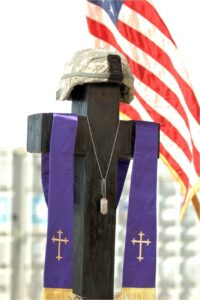
Religious men and women have always been there for people willing to make the ultimate sacrifice. U.S. Army Chaplains have always been willing to make that sacrifice in the name of their faith and saving souls.
That sacrifice has been recognized by Congress which approved the renaming of the Briargate post office in Colorado Springs in honor of fallen Army Chaplain (Capt.) Dale Goetz. In 2021, the U.S. Postal Service officially renamed the Briargate Post Office building to the Chaplain (Capt.) Dale Goetz Post Office; at that ceremony, Congressman Doug Lamborn said:
“Chaplain Goetz was a man of unwavering faith and repeatedly answered the call of duty to serve his country. His devotion to others and his love of country were an example to all. Naming this post office, in some ways, honors all chaplains and recognizes them for their invaluable service to our nation. I trust that the people of Colorado Springs will remember the patriotism and courage of Chaplain Goetz and the service of all military chaplains every time they enter or see this post office.
Chaplain Dale Goetz paid the ultimate price in carrying out his sacred duty of ‘Caring for the Soul of the Army,’” said Major General Thomas Solhjem, the United States Army’s Chief of Chaplains. “Chaplain Goetz exemplified the highest levels of commitment and self-sacrifice in ‘Bringing God to Soldiers and Soldiers to God’ in Afghanistan and everywhere he served. All of us who continue that same mission today, for Soldiers, Sailors, Airmen, Marines, and Guardians are honored by this event, and by the recognition given to our colleagues in ministry. We stand shoulder to shoulder in our own commitment to God and Country, to carry on the legacy of Chaplain Goetz, by ensuring that no one in our nation’s uniforms goes into harm’s way without spiritual support.”
Good men have always had to face down evil. Proverbs 3:5 is one of the most familiar verses in the Bible. “Trust in the Lord with all your heart and lean not on your own understanding .” Few have sought souls and faced evil with such trust in the Lord as Reverend Captain Dale Allen Goetz.
About the Author
Jim Fausone is a partner with Legal Help For Veterans, PLLC, with over twenty years of experience helping veterans apply for service-connected disability benefits and starting their claims, appealing VA decisions, and filing claims for an increased disability rating so veterans can receive a higher level of benefits.
If you were denied service connection or benefits for any service-connected disease, our firm can help. We can also put you and your family in touch with other critical resources to ensure you receive the treatment you deserve.
Give us a call at (800) 693-4800 or visit us online at www.LegalHelpForVeterans.com.
This electronic book is available for free download and printing from www.homeofheroes.com. You may print and distribute in quantity for all non-profit, and educational purposes.
Copyright © 2018 by Legal Help for Veterans, PLLC
ALL RIGHTS RESERVED



